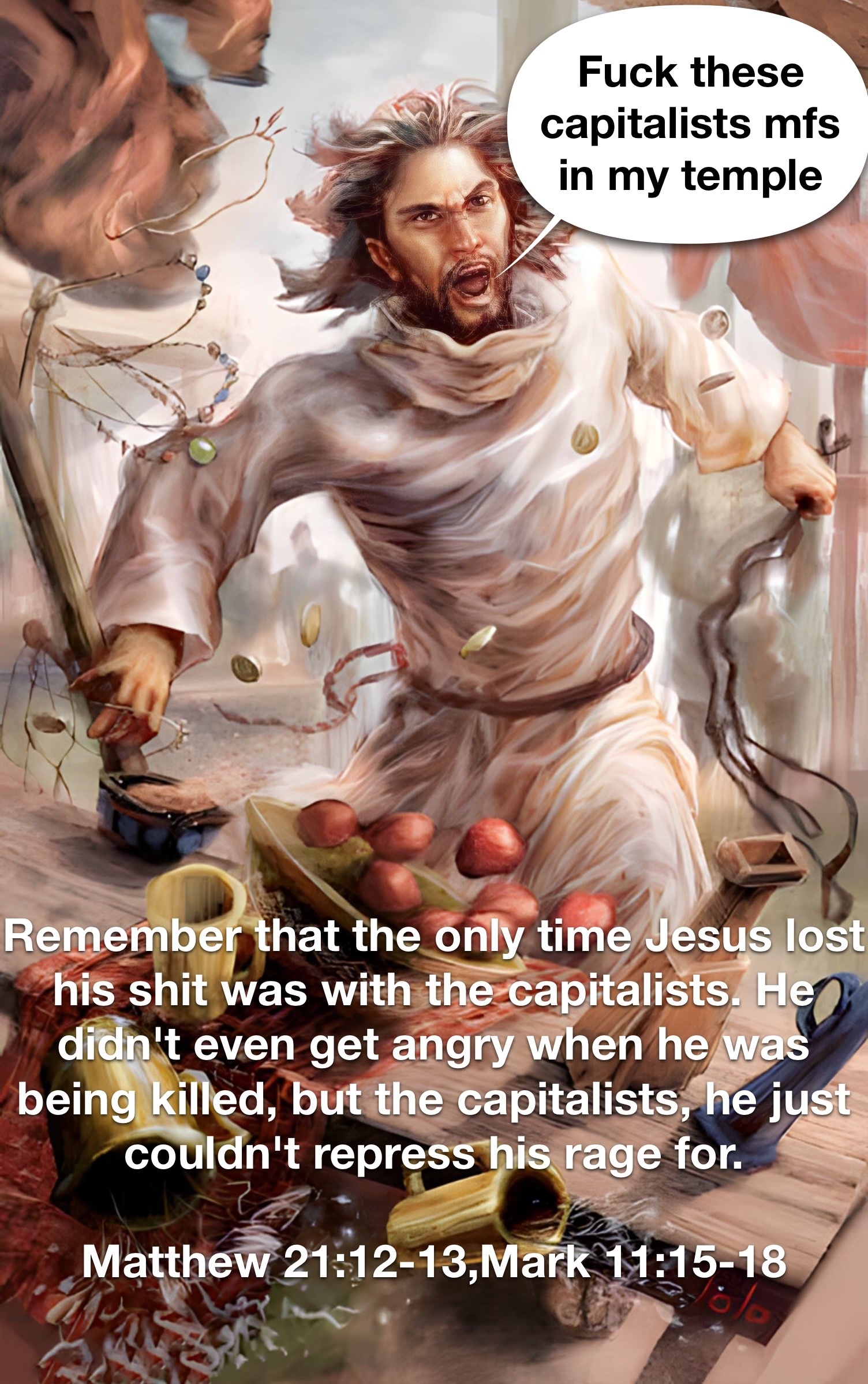this post was submitted on 17 Sep 2023
131 points (87.9% liked)
Memes
487 readers
1 users here now
Good memes, bad memes, unite towards a united front.
founded 5 years ago
MODERATORS
you are viewing a single comment's thread
view the rest of the comments
view the rest of the comments

Not exactly. Jesus didn't mind regular merchants, though he's pretty clear and consistent that a love of wealth is incompatible with a love of God. The deal with the temple is that they were basically selling God, selling salvation, and profiteering off of faith. IIRC, you couldn't bring animals or offerings to the temple, you had to buy them there, their lambs, their doves, etc, because how can they make money if everyone just brings their stuff? It's pretty telling that after years of doing his thing, Jesus finally gets merc'd just days after this happened. Thankfully, though, we all learned this lesson and never ever did anything like this ever again. =)
"On reaching Jerusalem, Jesus entered the temple courts and began driving out those who were buying and selling there. He overturned the tables of the money changers and the benches of those selling doves"
Sounds like losing his shit with the capitalists to me.
I mean, only if you completely divorce that from all context. The temple was supposed to be a place of solemn worship, and that was being lost in the face of money changing (the Jews didn't fancy giving God Roman money with the faces of emperors stamped on it) and selling sacrificial offerings. It became a place a business first. Jesus would doubtless beat the brakes off of a lot of American Christianity with its giant steel girder crosses, enormous state-of-the-art presentation halls, and pastors zooming around in private jets living in giant manors, telling people to just go ahead and send their rent money to the hotline. Jesus saw the corrupting influence that money has on religious institutions and made it clear that it was a line he felt shouldn't be crossed. The intersection between money and faith is a theme that pops up all over the New Testament, and it seems probable that the Romans brought unbelievable wealth to some people in that region (and may have even elevated the overall prosperity of the people in that region at the time by connecting them into their trade network). Each time it comes up, Jesus is very clear that the two don't mix. You can have God or money; not both. That said, Jesus doesn't really beef with merchants outside of the temple, except to say that it's easier for a camel to pass through the eye of a needle than for a rich man to enter heaven and advise them to choose a life of righteous poverty.
There weren't any capitalists around the time of Jesus' death. The word "Capitalist" refers to someone who extracts surplus value from labour by owning the capital - either machines and factories, or the financial means thereto - which workers operate. A capitalist can only exist in the context of industrialing or industrialised society, and there were no such societies during the Bronze Age.
I'm not sure about that, weren't nobles/landlords capitalists by extracting a rent from the 'working class'/laborers ?
No, obviously there were exploiters and rent-seekers during the Bronze Age, but capital has a distinct dynamic as opposed to other means of production such as land, namely that it can be expanded: A hectar of land in an agrarian society only produces so much grain, vegetables, or livestock every year, but the only upper limit for the production of machinery is the amount of available labour.
A land-owner can only expand at the expense of other land-owners, while capitalists also can - and are even required to - expand at the expense of the workers they employ. They use machinery and labour to obtain wealth and then use that to obtain more machinery, and so on. This arrangement has a dynamic of exponential growth, which no previous form of production had, and therefore capitalists are in a position to shape society in vast excess of what land-owners can and could do.
Landlording is not particular to capitalism, it is in fact a relic from past modes or production that continues in capitalism.
https://www.marxists.org/archive/marx/works/1847/11/prin-com.htm
I've never read that one, it's much better than the communist manifesto i.m.h.o., even if it's a bit too short to take into account any counter-argument, and it'd need an update almost 200 years later. I remember know that there's obviously a difference between the bourgeoisie and the nobility, but there must exist some kind of word encompassing both the nobles from the past and the modern bourgeoisie/capitalists. Anyway, here's a relevant quote i liked :
And, unrelated :
As well as :
The Joel Osteen brand of capitalism. Heretical religious capitalism.
Buying salvation was basically the tent pole of Catholicism as well prior to Protestant reformation which essentially (incredibly long story short) changed things a bit.
Or movie theatre capitalism